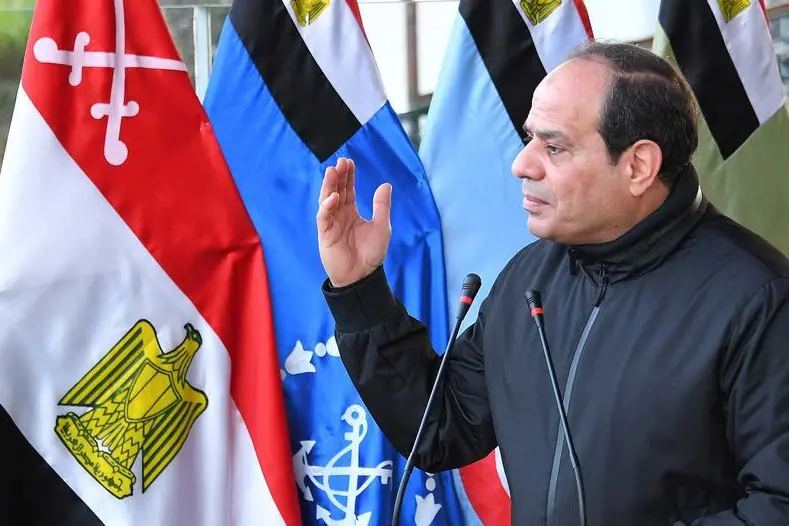PHOTO
CAIRO- The attack by Islamic State came as Egypt's defence and interior ministers walked towards a helicopter waiting to fly them out of the Sinai peninsula last December. Five army and police sources told Reuters that the militants fired a laser-guided missile at the aircraft, destroying it.
The ministers survived the Al-Arish air base attack, whose sophistication and boldness served as a reminder that President Abdel Fattah al-Sisi, expected to easily win re-election this month, is still engaged in a major military campaign to deliver the security he has promised to Egyptians.
Even with widespread public support, Sisi's security forces have yet to quash a stubborn insurgency in Sinai, an area that Islamic State is using as a base in its campaign to install an Islamic caliphate in Egypt. The United Nations singled out Islamic State in Egypt in a January report from its secretary general, expressing concern over the branch’s “resilience.”
The military mentioned the attack in a brief statement the day it happened but did not give details. A military spokesman, who also speaks on behalf of the defence ministry, later declined further comment on the attack. The Interior Ministry did not respond to telephone calls or reply to questions on Whatsapp about the helicopter attack.
The military previously has said that it has killed more than 1,800 jihadists in the area since late 2014, according to a Reuters review of its public statements over the period.
Last month, the army launched a highly publicized offensive, and says it has killed scores of suspected fighters and detained hundreds more in Sinai, the main stronghold of Islamic State after their defeat in Libya, Iraq and Syria.
The military says the new campaign features unprecedented coordination between the army, navy and air force in Sinai, and that these tactics should help it clear the peninsula of militants.
Sisi's supporters argue that the security situation now, although not completely secure, is better and more predictable than the unrest that rocked Egypt for years after the Arab Spring uprising of 2011. Sisi's office did not respond to requests for comment about the security situation.
But years of military action in the Sinai have not stopped Islamist fighters launching attacks intended to destabilise the government and stir up unrest. In the past four months, they have carried out two spectacular assaults there - on the air base on Dec. 19, and at a mosque on Nov. 24, killing more than 300 people.
In the helicopter operation, military and police sources say jihadists commandeered a house on the edge of the air base on the day of the attack and used a Russian-made Kornet missile, a much more advanced weapon than the rifles, suicide vests and mines the militants mostly use.
It was a rare and close targeting of senior government officials by Islamists, and the attack alarmed Egypt's security establishment, several foreign diplomats said.
"BRUTE FORCE"
The attack came three weeks after Sisi ordered his generals to use "brute force" against jihadists.
Egypt's military is using warplanes, tanks and troops that have battled radical Islamists in the Sinai for years.
Some diplomats and analysts say the army must adopt more effective counterinsurgency tactics and avoid alienating residents with the more destructive methods of air raids, curfews and buffer zones that have razed populated areas and radicalised residents.
"We're seeing the exact same military operation (as before) - aerial and ground force bombardment, mobilisation of heavy armoured vehicles on the ground," said Mohannad Sabry, an Egyptian author and researcher on security in Sinai.
A Western diplomat said Egyptian authorities have been focusing their military strategy on conventional warfare by using heavy weapons rather than adopting more targeted, intelligence-led tactics to eradicate extremism.
Military spokesman Colonel Tamer al-Rifai told Reuters that security forces were closing in on militants and blocking off their supply and escape routes.
"While one part (of the military) is searching houses, another is raiding terrorist hideouts in populated or unpopulated areas ... the operation won't end" until militants are rooted out, Rifai said.
He said in a recent televised message that civilians would be financially compensated for material damage resulting from fighting, and that there were hundreds of development projects taking place in Sinai, without elaborating.
More than a dozen soldiers have died in the operation, the army says, adding to hundreds in recent years. Islamic State says via its online media outlets it has killed dozens of soldiers in the last month, including through the extensive use of roadside bombs.
Islamic State filmed the air base attack in a video released online showing a guided missile destroying a stationary helicopter. Reuters could not independently verify the video's authenticity.
BLINDFOLDED
Farmer Mohamed Sweilam told Reuters Islamic State fighters took over his house near the base on the day of the attack. Five army and police sources say that is where the militants launched the missile from.
"A car with armed men wearing balaclavas and some in military fatigues pulled up. At first I thought they were police," Sweilam, 36, said.
"They blindfolded me, drove me somewhere for several hours, then took me back. I didn't know what had happened until the next day when police came to search the house and question me (about the attack)."
Sinai Governor Abdel Fattah Harhoum announced after the attack a plan to create a secure perimeter extending west and east of the airport.
Some residents were sceptical.
"They (authorities) think this will protect the airport, but they're wrong. It will just make people angry," said Mostafa Sayed, 51, whose home is also in the zone slated for clearance.
Harhoum said people forced from their homes would receive compensation.





















